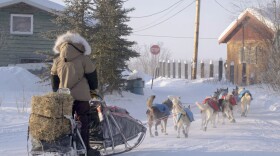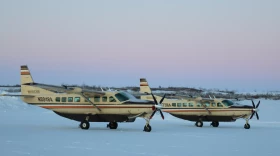The Alaska Desk is a statewide reporting collaborative between Alaska Public Media and public radio stations KHNS in Haines, KNBA in Anchorage, KUAC in Fairbanks and a regional Aleutians partnership split between KUCB in Unalaska, KSDP in Sand Point and KUHB in St. Paul. The partnership supports four reporters, three editors and a grants writer and manager.
The goal of the Alaska Desk is to better serve the communities where we live, and all Alaskans, by enhancing local news coverage of rural communities throughout the state. The Desk provides editing support and professional development to public media reporters, many of whom are in one- and two-person newsrooms. Another purpose of the Alaska Desk is to build stronger collaboration with the 27 public broadcasting stations in Alaska.
This partnership is made possible by a grant from the Corporation for Public Broadcasting and support from the Robert Wood Johnson Foundation.
-
Frontrunner Josi Shelley said her team of 12 sailed along the Yukon River, but the extreme temperatures were wearing on her.
-
All of the lawsuits cite the initial finding that the plane flew into icing conditions while overweight.
-
Sen. Lisa Murkowski, who co-led the oversight hearing, said the program helps both the federal government and Indigenous communities in Alaska and across the country.
-
Kipnuk leaders are calling hundreds of tribal members to determine the village's future after last fall's storm caused widespread destruction.
-
The family of JaDee Moncur, one of the passengers, filed a wrongful death lawsuit in Nome Superior Court on Thursday.
-
The campaign came the same week that Vizsla announced plans for the project for this year – and touted a formal letter of support from Gov. Mike Dunleavy.
-
The remnants of Typhoon Halong destroyed homes, contaminated water and left Kipnuk residents with a critical choice: rebuild in the same spot or move to higher ground?
-
Recent UAF grad Kendall Kramer is one of eight Alaskan cross-country skiers competing in Milan-Cortina this week.
-
The Department of Interior said it was illegal in the first place to grant Nuiqsut rights over an area inside NPR-A.
-
The Army installation has restored its regular dining facility hours after a service disruption that began in October.










